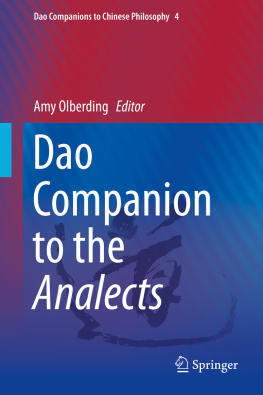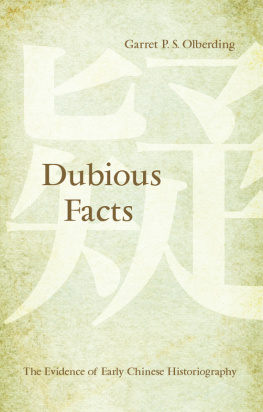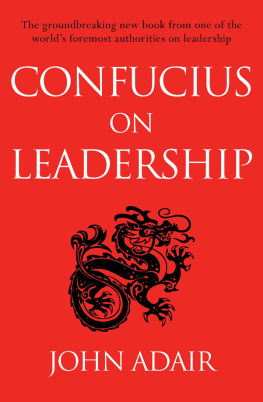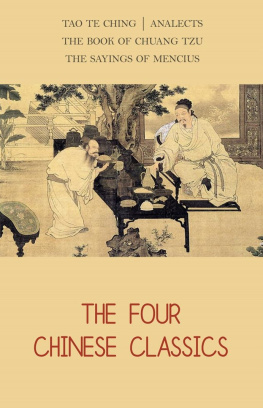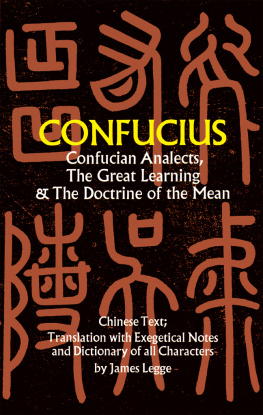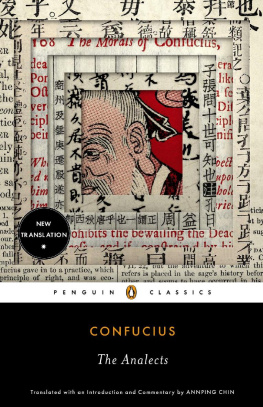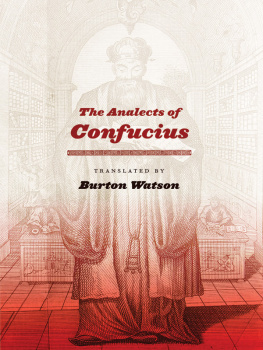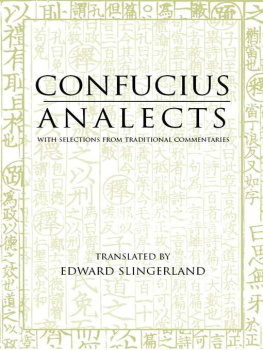Few texts in any cultural or philosophical canon are as influential as the Lunyu , or Analects . The text has been received as one of the earliest and most authoritative accounts of the life and thought of Confucius, Kongzi , and thus as a founding document in the tradition associated with him. The Analects has inspired generations of readers, informed the work of myriad philosophers, literati, and critics, and exercised considerable power over the cultural imagination. Likewise, Confucius, the thinker and moral exemplar at the heart of the text, enjoys an uncommon stature in both Chinese history and in the worlds wisdom traditions. He is, as the Analects tells us, akin to sun and moon, achieving heights of learning and sagacity others simply cannot approach (19.24). It is difficult to overstate the sweeping and profound influence of this text and its protagonist. The work assembled in this volume aspires to provide an orientation to the Analects and to the thought of Confucius as it ostensibly features in that text. This brief introduction, then, simply provides short sketches of the history of the text, of Confucius, and of the structure of the volume itself.
The Analects
While Tae Hyun Kim and Mark Csikszentmihalyi provide, in of this volume, a detailed and sophisticated account of the textual history of the Analects , it is nonetheless useful to say here, in far briefer form, a bit about the text itself. Popular perceptions of the text, throughout much of Chinese history and perhaps even now among its global readership, have held that the text is a largely accurate and coherent record of Confucius views and life composed by his students or their followers at a time closely proximate to Confucius own life. The compositional history of the text should, however, make us wary of such assumptions.
The version of the Analects with which most readers are familiar, what is typically deemed the received text, dates from several generations after Confucius (551479 B.C.E.), from the Han Dynasty (206 B.C.E.220 C.E.). As Kim and Csikszentmihalyi detail, it was during this period that the text began to enjoy considerable scholarly attention. The History of the Han ( Hanshu ) records that there were three different versions of the Analects in circulation early in the Han, one of which was said to be ancient and discovered concealed in the walls of a home believed to have belonged to Confucius. None of these three versions of the text survives today, however. Instead, the received text is the product of effort by Han Dynasty scholars to synthesize a single version of the text out of those available to them. Two notable early scholars of the text, Z hang Yu (d. 5 B.C.E.) and Z heng Xuan (127200 C.E.), each compiled his own version of the text by editing together material from the texts then in circulation, the latter also appending commentary aimed at illuminating the text. These versions of the text, though very popular in their time, are also lost to us. The received version apparently derives from them, however. It is the work of H e Yan (190249 C.E.), who compiled his own eclectic version of the text by drawing on the works of Zhang and Zheng. Thus while presumably rooted in earlier versions of the text, the received version of the Analects is of relatively late date, quite temporally distant from Confucius and those who immediately followed him.
What we know of the origins of the received Analects of course immediately defies any assumption that this version of the text is the product of Confucius immediate intellectual descendants. However, the origin story of the Analects is more complicated still and it is clear that we cannot even assume that the received text is, in any straightforward or complete way, rooted in the work of Confucius near intellectual descendants. For there are reasons, internal to the text itself, to think that the material assembled therein was crafted over a far more generous temporal span than such an account of its origins will allow.
Beginning in the Qing Dynasty (16441912), scholars of the Analects began to query closely the significance of the texts stylistic and linguistic variety. The tradition of textual scholarship they initiated continues to this day and, while there are many ongoing debates about just what conclusions may be drawn, what is clear is that the variations in linguistic conventions, syntax, and literary or argumentative style found within the Analects indicate that it is a text composed over several generations. It is, put simply, a pastiche of multiple historical strata, with some passages clearly dating to significantly later periods than the traditional popular view of the text could permit. To give but one uncontroversial example, the last five books of the Analects appear to be of later vintage than the rest of the text. Book 19, for example, is entirely composed of claims made by and dialogues between Confucius students, with no direct purported quotation of Confucius himself. More generally, Books 1620 abandon the practice in the prior books of referring to Confucius as zi , or the Master, instead using Kongzi (Master Kong) or his style name Zhongni . So too and perhaps most basically, many the passages found here are simply strikingly and dramatically longer than what is found in the rest of the text. These and other indications internal to the text itself have led scholars to conclude that Books 1620 represent a late stratum and perhaps multiple later strata of the text.
As noted above, the work of parsing the Analects in order to identify probable historical strata within it is ongoing. Identifying stylistic and linguistic anomalies is one element in this effort. Another is comparing the multiple styles of the text to those found in other texts of more certain vintage in order to trace, through such comparisons, rough probable dates for particular passages or groups of passages in the Analects . This work is the subject of much scholarly debate and secure conclusions remain elusive, but what is indubitably clear is that the traditional popular view a view that ascribes historical accuracy and authenticity to the texts account of Confucius by way of dating the texts origin in temporal proximity to Confucius life and the lives of those who knew him cannot be sustained. While individual passages or groups of passages may have a relatively early date, the text as a whole unambiguously does not. Some passages are certainly apocryphal and, moreover, we cannot assume that all reflect a common purpose or agenda.

